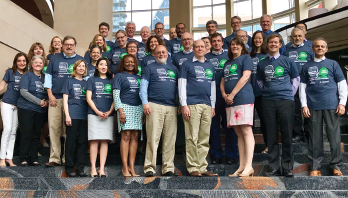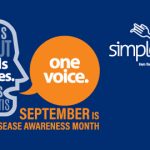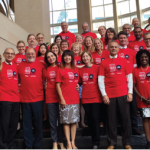
ACR volunteer leaders kick off RDAM 2018.
As rheumatology professionals, we focus on how to achieve better outcomes for our patients: lower disease activity, remission, milder symptoms and prevention of joint damage or serious complications, such as heart disease.
Another outcome is just as important: good quality of life. What can we do to engage our current patients and those at risk for developing rheumatic disease, and inspire them to live healthier, more active lives? How can we create an environment in which people with rheumatic diseases can really live well?
Terry Bradshaw Returns as Our Spokesperson
September is Rheumatic Disease Awareness Month (RDAM). In the past, we’ve used this month to focus on awareness efforts. This year, our message will go a step further. We’ll offer patients some steps they can take to achieve wellness in their lives. We want patients to know that we, their healthcare providers, are their ideal teammates in achieving positive outcomes. We want patients to take action to improve their health and wellness, and we will give them the tools to do so.
Like last year, RDAM advertising and messaging will feature National Football League Hall of Famer Terry Bradshaw as our celebrity spokesman, helping us reach a wide audience. Terry will be featured in a public service announcement (PSA) focused on health and wellness lifestyle messages that includes a call to action for people to sign the ACR’s pledge to live well. We’ll feature messages from the PSA in high-visibility airport advertising and a national print piece in which Terry discusses how he lives well with his rheumatic disease.
Last year, advertising in the world’s busiest airport, Hartsfield-Jackson in Atlanta, was highly successful and generated goodwill from external partners, such as the Centers for Disease Control & Prevention. This drove traffic to the ACR’s Simple Tasks website, and we will use this same approach to promote the 2018 RDAM messages.
We want patients to take action to improve their health & wellness, & we will give them the tools to do so.
What Can You Do?
Encourage your patients to sign the ACR’s pledge to live well with rheumatic disease. Stress the importance of quality of life and wellness, but also let each patient know they can take an active role in achieving their goals.
What’s in the pledge? Simple, concrete action steps patients can take in their daily lives, such as getting some kind of regular exercise, following a balanced diet, taking care of their mental and emotional health, and being an active participant in their own care by following their treatment plan and advocating for their own care.
What do patients get when they sign up? Each person who signs the ACR’s pledge will be sent a pedometer and wristband. They’ll also receive simple tips they can follow to get started with their health and wellness journey. By providing their email address, they’ll be automatically signed up for relevant Simple Tasks updates and tips.
The Rheumatic Disease Report Card
The ACR’s media relations efforts this year will focus on an exciting, first-of-its-kind, Rheumatic Disease Report Card that seeks to answer the question, “How easy is it to live with rheumatic disease in my state?” This groundbreaking Report Card assigns states letter grades based on such factors as access to rheumatology care, affordability of care and encouraging healthy lifestyle habits that ease the burden of rheumatic disease.
To ensure the Rheumatic Disease Report Card aligns with the ACR’s strategic goals, it was developed by an interdisciplinary task force comprising members from three committees: Communications and Marketing (CMC), Government Affairs (GAC) and Rheumatologic Care (CORC). The Report Card Task Force carefully developed grading indicators, methodology and weighting to come up with each state’s grade, and played an integral role in identifying the key messages important to promoting the findings.
During September, the ACR will promote the new Rheumatic Disease Report Card through a satellite media and radio tour. Our goal is to raise awareness about important issues the CMC, GAC and Report Card Task Force believe are aligned with the ACR’s strategic goals. We hope it drives discussion about some of the important issues affecting our patients and what states can do to improve their grade and help people live healthier lifestyles.
With an estimated 54 million U.S. adults—one in four—having a doctor-diagnosed rheumatic disease, it’s never been a more critical time to turn the tide on this public health crisis. Doing so will require patients, physicians and policymakers working together to address the access, affordability and lifestyle factors that can mean the difference between a life cut short by pain and disability, and one well lived. Be sure to read the report and visit www.simpletasks.org/reportcard to download a fact sheet with information specific to your state that you can share. Talk with your patients, colleagues and local legislative contacts about ways to improve your state’s grade and the quality of life for every person with rheumatic disease.
I hope you’re as excited as we are about the 2018 Rheumatic Disease Awareness Month, and our comprehensive campaign to improve health, wellness and quality of life for everyone with rheumatic disease. Together, we cannot just encourage our patients to take actions that lead to wellness, but we must actively partner with them, so they set positive wellness goals and reach them to lead active, full and truly enjoyable lives.
David I. Daikh, MD, PhD, is the 81st president of the ACR. Dr. Daikh serves as the director of the Rheumatology Fellowship Training Program at the University of California, San Francisco and as chief of the Rheumatology Division at the SFVA Medical Center, where he directs the Rheumatology Clinic.



